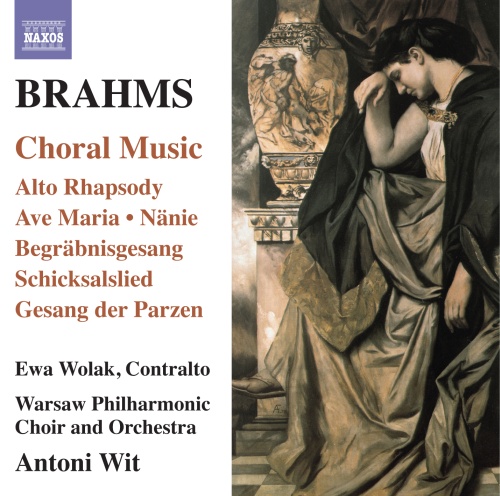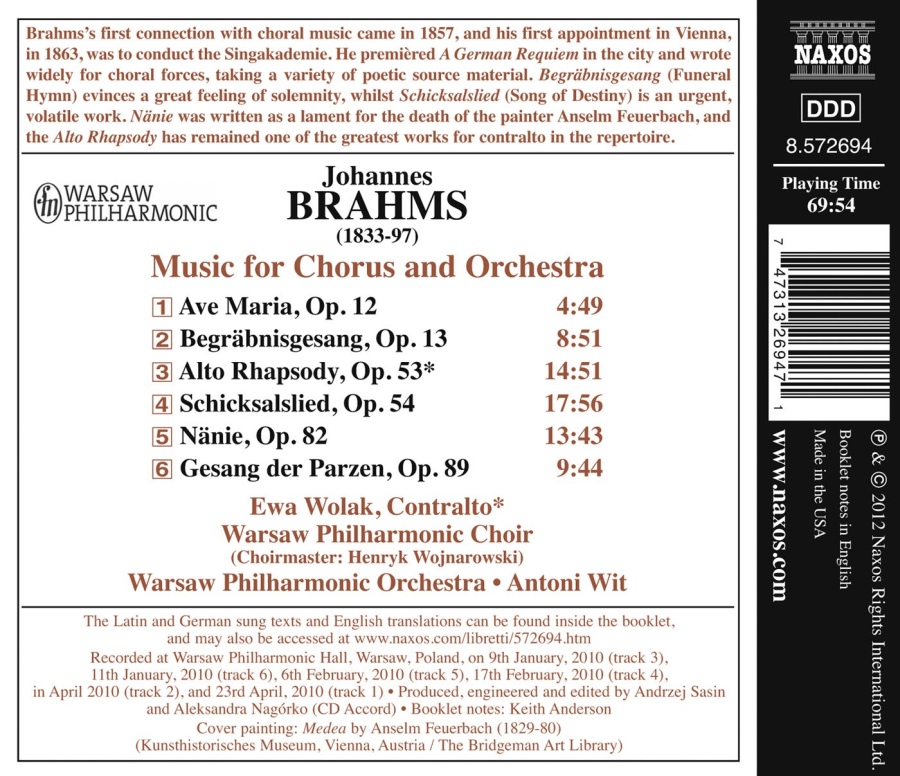
classical music distribution


(Produkt nie został jeszcze oceniony)

kompozytor
Brahms, Johannes
tytuł
Brahms: Music for Chorus and Orchestra
wykonawcy
Wit, Antoni;
Warsaw National Philharmonic Orchestra;
Warsaw Philharmonic Choir;
Wolak, Ewa
Warsaw National Philharmonic Orchestra;
Warsaw Philharmonic Choir;
Wolak, Ewa
nr katalogowy
8.572694
opis
Brahms’s first connection with choral music came in 1857, and his first appointment in Vienna, in 1863, was to conduct the Singakademie. He premièred A German Requiem in the city and wrote widely for choral forces, taking a variety of poetic source material. Begräbnisgesang (Funeral Hymn) evinces a great feeling of solemnity, whilst Schicksalslied (Song of Destiny) is an urgent, volatile work. Nänie was written as a lament for the death of the painter Anselm Feuerbach, and the Alto Rhapsody has remained one of the greatest works for contralto in the repertoire.
• Brahms: Ave Maria, Op. 12
• Brahms: Begräbnisgesang, Op. 13
• Brahms: Gesang der Parzen (Song of the Fates), Op. 89
• Brahms: Nänie von Friedrich Schiller, für Chor und Orchester, Op. 82
• Brahms: Schicksalslied, Op. 54
Works: • Brahms: Alto Rhapsody, Op. 53
• Brahms: Ave Maria, Op. 12
• Brahms: Begräbnisgesang, Op. 13
• Brahms: Gesang der Parzen (Song of the Fates), Op. 89
• Brahms: Nänie von Friedrich Schiller, für Chor und Orchester, Op. 82
• Brahms: Schicksalslied, Op. 54
nośnik
CD
gatunek
Muzyka klasyczna
producent
Naxos
data wydania
16-01-2012
EAN / kod kreskowy
747313269471
Produkt nagrodzony:
ICMA 'Nominee' (2012)

(Produkt nie został jeszcze oceniony)
cena 58,00 zł
lubProdukt na zamówienie
Wysyłka ustalana indywidualnie.
Darmowa wysyłka dla zamówień powyżej 300 zł!
Darmowy kurier dla zamówień powyżej 500 zł!
sprawdź koszty wysyłkiProduktu jeszcze nie zrecenzowano, chcesz być pierwszy?
Klienci, którzy kupili ten produkt, kupili również
różni kompozytorzy
North German Organ Music Vol. 1 (Lübeck) - Tunder, Hasse, Buxtehude, Schieferdecker, Bach, Bruns
MDG 320 1624-2
Pozostałe płyty tego kompozytora
różni kompozytorzy
Die Romantische Violine - Mendelssohn, Clara Schumann, Brahms, Robert Schumann, A. Dietrich
PMR 0043
różni kompozytorzy
Most Famous Piano Concertos - Tchaikovsky, Beethoven, Mozart, Brahms
PH 13033
Pozostałe płyty tego wykonawcy
Schumann, Robert, Grieg, Edvard
IDIL BIRET CONCERTO EDITION 1 - GRIEG, SCHUMANN: Piano Concertos
8.571270
Penderecki, Krzysztof
Penderecki : Works for Cellos and Orchestra - Concerto Grosso nr 1, Largo, Sonata na wiolonczelę i orkiestrę
8.570509
Penderecki, Krzysztof
Penderecki: Piano Concerto ‘Resurrection’, Concerto for Flute and Chamber Orchestra
8.572696
Napisz recenzję dla: Brahms: Music for Chorus and Orchestra
Zapytaj o dostępność produktu
Twoje zapytanie:
Odpowiemy na adres:
Produkt został dodany do koszyka

Brahms, Johannes
Brahms: Music for Chorus and Orchestra
1 szt












































